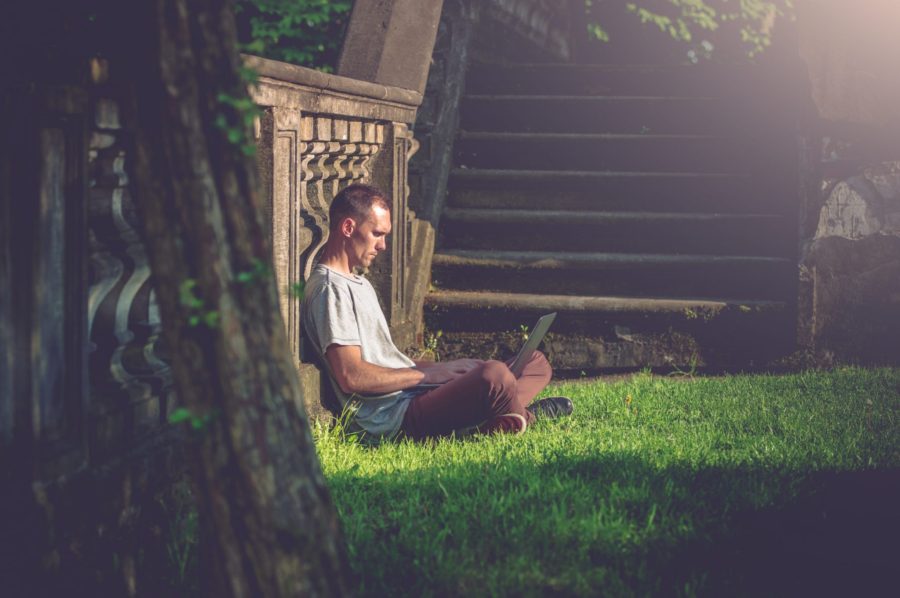Acquiring Comfort with Silence
05_28_2018
Acquiring Comfort with Silence
One of the things I’m quite certain about is that as one ages, one must acquire a comfort level with silence. While I can’t remember the name of the novel where I came across the following idea, the idea stayed with me nonetheless. The thought was expressed by the female protagonist who observed that one’s conversations as one ages become more of a monologue. In other words, one is very often having conversations with oneself.
Getting comfortable and appreciating the state of solitude is another point where I feel our society has not prepared us well. We’re used to noise, constant noise, and so we don’t have a lot of practice or appreciation for the gifts that silence can offer. Out of curiosity, I looked up the definition as well as synonyms for the word “solitude.” I was surprised to see that loneliness was included as a synonym. Not to be discouraged, I went to what I consider a more esoteric dictionary and consulted The Oxford Dictionary, and lo and behold I found a similar definition.
Equating these two concepts – solitude and loneliness – to mean the same thing is another indication of how we’ve missed the boat on valuing the gift of quiet reflection and thinking. To offset this mistaken equivalency, I sought and found some helpful quotes which follow:
- Loneliness expresses the pain of being alone and solitude expresses the glory of being alone. …
- To go out with the setting sun on an empty beach is to truly embrace your solitude. …
- Loneliness is the poverty of self; solitude is the richness of self. …
- In solitude the mind gains strength and learns to lean upon itself.
I trust that the quotes provide you with the direction I lean when it comes to appreciating the value of solitude. For the most part, I’ve always been pretty comfortable with being quiet. I read a great deal as a child and loved immersing myself in books. One of the reasons I continue to prefer books over audio tapes is I frequently find myself pausing as I read to either visualize the scene, ponder how it is impacting me emotionally, or noticing whatever memories or thoughts the passage is awakening within me. My comfort level with quiet time may also be the result of my introverted nature. As an introvert, I not only enjoy quiet time to think and reflect, it is like oxygen to me. If I find myself in a situation – whether professional or personal – in which I’m expected to spend ongoing hours of time with others – I start to get antsy and seek ways to withdraw and have some time to myself. When I travel with most others, I require my own room so that I know I will have some time to myself at the end of the day.
Because I have a natural comfort level with being alone, I’m not sure how helpful my insights on settling into quiet time will be to those who find it very adverse and stressful. Let me begin with sharing what I notice about people who struggle with silence. First, I find that they frequently can’t stop talking. I was out having dinner by myself last night –something which I’ve learned to do comfortably – and I happened to be seated near a couple (pretty sure they were husband and wife) who I would guess were in their 70s. They were speaking in a language other than English so it wasn’t like I was eavesdropping.
Here’s what made me notice them. Since I was eating alone, when seeing them seated the thought crossed my mind if I was missing something not having a mate to eat with on a regular basis. Well, that thought didn’t last long as I listened to a one-hour, one-sided exchange. The woman never stopped talking; the only words I heard the husband utter were what he was ordering to drink and to eat. They certainly didn’t seem engaged with one another. The scene triggered conversations for me in which sometimes I feel “trapped” listening to someone go on and on about basically nothing. Words on their own don’t automatically lead to connections…there has to be listening and meaningful dialogue for connections to occur. I wondered if the gentleman at the next table thought of his wife as a radio, broadcasting 24 hours a day.
I observe people all of the time that are constantly looking at their phones. One of my pet peeves includes people walking, not looking where they are going, and basically running into people as they’re not paying attention to where they are going. I’m sure I’m not the only one who has witnessed a family of four – two parents and two kids – out to dinner and everyone is on his/her cellphone which means they are not talking to one another. That is not quiet time, actually quite the opposite….it may not be “noise or talking” in the way we traditionally define it, but it is a buffer or escape from spending time alone.
So what I can share that may be useful to others. First, spending time with others is also important. We are social beings and benefit in many ways from the companionship of others. Realizing that “alone time” is not endless, and that there are fairly easy ways of knowing when you’ve had enough, along with knowing how to combat feelings of loneliness are all good “handholds” to be aware of as you explore a practice of getting use to spending time alone.
I usually do a quick check-in each morning to see what I’m feeling the need for. If I’m been travelling on business and meeting with people for several days, I’m generally ready to spend time alone. Note spending time alone doesn’t mean that you have to stay at home. Sometimes I may go out to breakfast or lunch alone as I’m in the mood to be out but not necessarily to engage with people. However observing people and interacting with them on some level doesn’t feel intrusive.
If I feel like I need to get out and about, I go out. I may reach out to a friend to do something together, or I may go to the library and read in the Commons room surrounded by others. One of the things that best helped me get more comfortable with being alone is to realize that being alone occurs in finite periods of time, and a new day dawns and I can make plans with others.
I think one of the major threats to our country is that we as people are not carving out enough time for thinking or reflection. I interact with and/or observe too many people that appear to me to have no thoughts of their own; they are just repeating what they’ve heard or been told via the media is the correct way for them to think. They’re not allowing the time for themselves to question or evaluate their experience, beliefs, or values with what they have allowed into their minds.
Circling back to my opening remarks, like it or not, I believe we all benefit if we can learn to appreciate and allow for quiet times in our lives. If being alone with oneself is anxiety producing, that’s probably a good sign that there is something that needs to be explored or examined. I’ve heard people say that when they spend time in reflection, they frequently realize that they are either reliving moments form the past – often wishing they had done things differently – or they are worrying about the future. If that is what occurs in quiet time, no wonder people put off being alone. It takes some practice how to learn to just sit quietly and not get caught up in the thoughts that arise when there is open mental space.
My experience is that once I realized that feelings of loneliness are not everlasting and that I can take steps to counter them, I became much more at ease with spending time by myself. As I age and seek to continue to evolve, to grow, and to ultimately pursue greater wisdom and compassion, I know that it is essential for me to have some quiet time to reflect, ponder, and learn.


